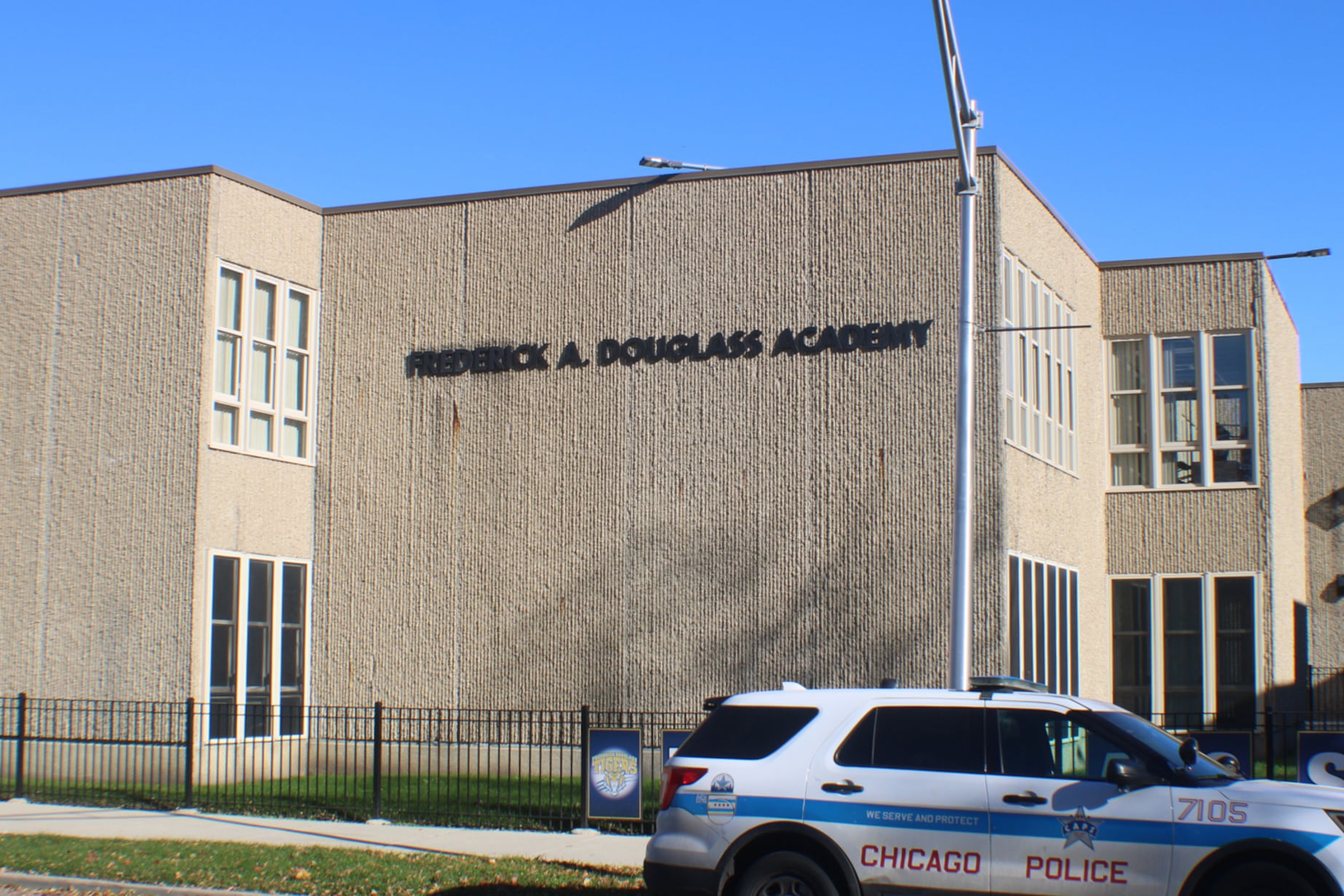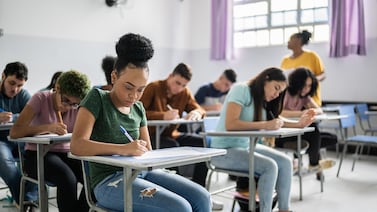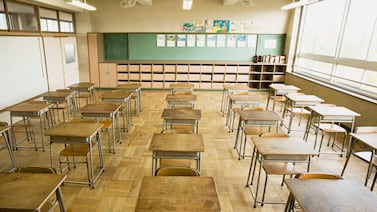Sign up for Chalkbeat Chicago’s free daily newsletter to keep up with the city’s public school system and statewide education policy.
During a meeting in which tempers flared and community members argued over the merits of school police, Chicago’s Board of Education voted Thursday to eliminate all school police officers by the next academic year and create a new “holistic” school safety policy.
The board approved a resolution that directs Chicago Public Schools CEO Pedro Martinez to draft a school safety policy by June 27 that explicitly bans school resource officers, or SROs, from campuses. These officers are trained and employed by the Chicago Police Department, but the district covers their salaries.
The district’s new school safety policy must instead emphasize more “holistic” approaches to student discipline, such as restorative justice practices, the resolution said. Such practices, which focus on conflict resolution instead of punishment, have replaced sworn officers in some schools over the past few years. The resolution approved Thursday will directly impact the 39 high schools that currently have a total of 57 SROs.
The board’s decision — which drew dozens of public speakers, including 20 elected officials — addresses a yearslong grassroots movement that has pushed the district to remove SROs from school campuses. Advocates instead want the district to spend more money on social workers, mental health resources, and practices focusing on conflict resolution. A recent study found that schools implementing restorative justice practices saw drops in student arrests. Students also reported feeling more safe.
But the decision drew significant pushback as well, including from several city aldermen, who argued that schools in their communities feel safer when officers are on campus.
At one point during Thursday’s meeting, former school board member and community activist Dwayne Truss sparred with audience members over his criticism of the board’s decision — causing advocates to chant “SROs, we want you out.” Truss was on the board when it decided to let Local School Councils vote on whether to keep their officers. He argued that was the most “democratic” solution at the time and still is today.
Truss, who is Black, accused the Board of Education of “telling Black folks, ‘We know what’s best for you.’”
In defending the board’s decision, Board Vice President Elizabeth Todd-Breland said it was fulfilling a 2020 promise from the previous board, which committed to phasing SROs out of schools. The board’s goal is to reduce disparities among those who are disciplined at school, she said. Calls to police disproportionately involve students with disabilities and Black students, who are also disproportionately suspended, compared to their peers, according to the resolution.
The board has discussed the policy change for several months with the district and Mayor Brandon Johnson’s office, Todd-Breland said, noting that it’s “about more than just SROs.”
“This is a shift, and this shift to a model of holistic safety is really necessary for all of our schools, not just schools that currently have SROs,” Todd-Breland said. “Continuing the district’s progress in moving from a more punitive approach to a holistic, healing centered approach is evidence-based work.”
Board member Rudy Lozano Jr. said the district will still rely on the Chicago Police Department to help with arrival and dismissal and to respond to emergencies. In response to criticism about pulling power away from LSCs, board member Tanya D. Woods said state law requires the district to “deal with discipline disparities.”
Makayla Acevedo, a junior at Hyde Park Academy and a member of Southside Together Organizing for Power, or STOP, said officers at her school don’t stop the many fights that break out. She wants to see the funding for SRO salaries go toward more career programming at her school, such as for nursing training, as well as restorative justice programming.
“I just feel like we just really need those funds, to invest all of that money to get the programs in order for all students … to be successful in life and reach their dreams,” Acevedo said.
The district has spent nearly $4 million on “alternative safety interventions,” such as restorative justice, at 14 schools where SROs have already been removed, according to the resolution.
After the meeting, Martinez said, “We actually have not paid for any of these services for CPD for the last three years. We weren’t even going to pay for this year.” A district spokesperson later confirmed that although money was allocated, no payments have been made to the police department since 2020, when schools went remote during the COVID-19 pandemic.
Longstanding tensions come to a head
The movement to remove SROs grew in 2019, when the Chicago Police Department was placed under a federal consent decree. The next year, after protests over Minneapolis police officer Derek Chauvin’s murder of George Floyd, the district asked LSCs to vote on whether they wanted to keep SROs.
But the resolution has exposed long-simmering tensions.
At Thursday’s meeting, arguments erupted between Truss and audience members from organizations that have long pushed for the district to remove SROs. Those organizations include Brighton Park Neighborhood Council, Good Kids Mad City, and STOP.
As they yelled at each other, the board called a brief recess and cleared the room for several minutes.
Truss cited recent shootings outside three Chicago schools that left four students dead, and argued that some communities may feel the need to keep police at schools in order to feel safe. That sentiment was echoed by several other speakers.
“The fact is that Black folks are tired of getting disrespected by folks who don’t live in our community,” said Truss.
Ald. Monique Scott, whose 24th Ward represents North Lawndale on the West Side, said the decision needs to be made by local communities. Scott’s brother and predecessor, Michael Scott Jr., replaced Truss on the school board in 2022 and served until the end of former Mayor Lori Lightfoot’s term last summer.
“Every school doesn’t have to have them, but some schools need them and I think that it should be based on the LSC to determine that,” Scott said.
The district’s Local School Council Advisory Board, charged with advising the Board of Education, “overwhelmingly” approved a resolution Feb. 12 that called for leaving decisions about campus police to LSCs, according to Froy Jimenez, a member of the advisory board and a teacher at John Hancock College Preparatory High School.
The advisory board members were concerned that stripping LSCs of that power chips away their right to make decisions about their schools, Jimenez said. Jimenez noted that his own LSC voted to get rid of the school’s campus police. However, Jimenez said he represents a part of the city “where some schools would want to have [them].”
The board’s decision was celebrated by several advocacy organizations that have rallied for years to stop staffing police in schools, as well as the City Council’s progressive caucus. Several speakers asked the district to spend more money on social workers and boost restorative justice.
Kennedy Bartley, executive director of United Working Families, a progressive political organization, credited Thursday’s vote to the years of advocacy from students and educators, which “built enough political power to elect a mayor with a mandate for transformative change.”
The Chicago Teachers Union, which also supports the change, has submitted a request with the district to bargain over the new school safety policy, CTU Vice President Jackson Potter told the board Thursday. Potter said the union wants several things to be considered in the new policy, including more “trauma supports” and training on restorative practices.
Becky Vevea contributed.
Reema Amin is a reporter covering Chicago Public Schools. Contact Reema at ramin@chalkbeat.org.







